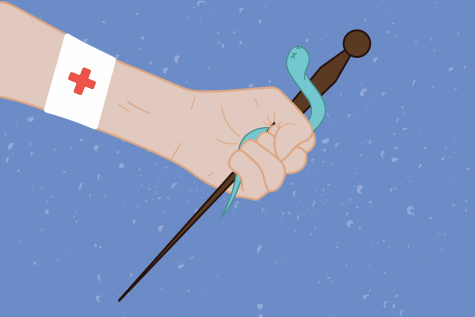States are abusing the coronavirus pandemic to restrict reproductive justice
April 1, 2020
LaKia Williams is the communications and outreach coordinator for ReJAC NOLA, a fellow for MyLASexEd, an advisor on the student activist advisory committee for ASEC, and the founder and coordinator of Big Easy EC.
Sexual and reproductive health care has long been a contentious topic throughout the United States. Placing much of the world on pause, the recent global COVID-19 outbreak has unfortunately allowed for assaults on reproductive rights and health to accelerate.
The COVID-19 public health concerns have been a convenient pretense for anti-choice states to push unconstitutional mandates that limit abortion access. Texas, Ohio and Louisiana have instituted mandates prohibiting abortions. Texas’ mandate makes abortions punishable by fine or imprisonment. The Texas Attorney General signed an executive order stating that all medically unnecessary surgeries must stop. Arguments over whether an abortion is a medically necessary or unnecessary procedure, however, are necessarily political.

Abortions are medically necessary for people who are pregnant and do not wish to proceed with a pregnancy. States like Texas, Ohio and Louisiana refuse to recognize abortion as the critical healthcare procedure that it is.
While Ohio’s mandate states that most surgical abortions have to be stopped. Texas has held that, “any type of abortion that is not medically necessary to preserve the life or health of the mother” cannot be performed.
Considering that most abortions are medical abortions that do not require surgery, Texas’ emphasis on all abortions and not on surgical abortions alone is an attack on reproductive justice. The mandates are justified by the argument that non-medically necessary surgeries should be stopped to free up supplies such as gloves and masks to combat the spread of COVID-19. However, these supplies are not necessary in most abortions because most abortions are not surgical abortions.
These state actions — in the middle of a global pandemic — show just how far some states will go to restrict abortion access and bodily autonomy. Meanwhile, medical professionals have advised against the mandates, with the American College of Obstetricians and Gynecologists releasing a statement saying that abortions are “an essential component of comprehensive healthcare” and thus should not be restricted by these new mandates. While abortion clinics in Louisiana will continue to provide abortions, they had to temporarily pause operations to assess the impact that the Louisiana Health Department’s memo on stopping “non-emergency services” would have.
Steffani Bangel, executive director of the New Orleans Abortion Fund (NOAF), said “forcing people to have pregnancies, especially when they may have just lost their job, is cruel.”
Bangel also held that these mandates prohibiting abortions are new forms of “back door bans” aimed at restricting abortion access, a practice with which Texas, Ohio and Louisiana are familiar. A Louisiana law aimed at reducing abortion access by imposing unnecessary requirements on professionals who perform abortions is currently at the Supreme Court to determine its constitutionality.
The restrictions on abortions have also made advocacy for other reproductive rights and healthcare all the more necessary.
The state of Louisiana’s stay at home mandates have left broad segments of the population without jobs, but others in “non-essential jobs” are left only with the option to work from home. With so many people ordered to stay isolated, reproductive rights and justice advocacy groups have been forced to transform their activism for people’s basic healthcare needs and the guarantee of their autonomy over their own bodies.
Organizations such as NOAF and #MyLASexEd, a youth-led sex education campaign that focuses on storytelling, are among the groups that had to re-evaluate their organizing strategies. NOAF’s work generally includes campus engagement, canvassing in communities and escort clinics for patients seeking abortion care. All of these forms of advocacy are based on grassroots organizing where building community and interacting on a one-on-one level are critical.
To adapt to the conditions of the COVID-19 pandemic, these organizations have found new ways to do the work that they are all already doing. There has been a surge in digital activism. MyLASexEd has changed its focus from campus organizing to “social media outreach to meet people where they are at,” according to Ashley Sheffield, a #MyLASexEd ambassador and campus organizer for Feminist Majority.
Sheffield highlighted the fact that while the means of organizing has to change, the purpose is not compromised.”
We are preserving with our mission for medically accurate sex education and ensuring that young people have the information necessary to make educated choices for their lives,” Sheffield said.
With abortions out of reach for residents of Louisiana and Texas, emergency contraceptives are even more essential. EC is a form of birth control that can be taken up to three days after unprotected sex. EC cannot terminate existing pregnancies. Organizations and programs such as the American Society for Emergency Contraceptives, Plan B NOLA and the Big Easy EC program at Tulane are now the difference for some people being forced to carry an unplanned pregnancy to term or to not.
Big Easy EC and Plan B NOLA, a program by the Reproductive Justice Action Collective, provide free EC to people in the greater New Orleans area. With the requirements of social distancing, these programs are using new ways to distribute EC that does not include physical interactions. Director Kelly Cleland is leading ASEC in securing donations to purchase EC to set up distribution sites across the nation. Even with all the attacks on reproductive justice, the work of advocates does not stop.
Amidst all the attacks on reproductive rights and justice, Bangel has expressed a hopeful optimism. With the nation’s reaction to COVID-19, people are starting to take notice of the “immense injustices” in the U.S.
According to Bangel, people are now more than ever more able to see “how close they are to not having autonomy over their lives.” Bangel hopes that with this newfound awareness, people be more empathetic to the plight of people who simply seek full bodily and reproductive autonomy.
Regardless, the work of reproductive justice advocates will continue. No matter how many changes need to be made, the work will get done because the people need it and they deserve it.





















Leave a Comment